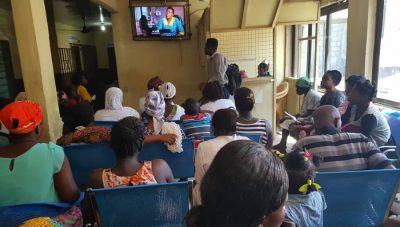Join a powerful, unprecedented alliance for better eye health for all.
Join IAPB-
Choose an alternate language here
Behavioural change communication plays an important role in health promotion. It utilizes different approaches and forms to effect a positive change in individuals, a group of people or an entire community. It highlights and encourages positive health seeking behaviour. Behavioural change communication drives a key component of the “Strengthening the Ghanaian Health System to promote the uptake of child eye health services” – a SiB-funded project implemented in Ghana by Orbis International. The project deploys several activities and interventions including behavioral change communication using various platforms – radio, television, posters, health talks delivered at various community gatherings. The project also utilizes an innovative method known as “Facilitated Film Screening” to raise awareness about positive eye health seeking behaviours in communities in the project area. It uses the power of film to raise awareness and empower people to take positive actions and steps to change their lives.
In 2017, Orbis International partnered with Social Transformation and Empowerment Projects – STEPS, a non-profit organization that uses socially relevant documentaries to drive change in behaviours and attitudes as well facilitate conversations on both local and global levels. STEPS produced a documentary in Twi, the local language of the project intervention area. The documentary, Meresa Biom, highlights the experience of 10-year-old Hikmah Naseem, who suffered a traumatic cataract at age 7. It highlights the impact of the cataract on the life of Hikmah, her family and the community around her. It also highlights positive eye health seeking behaviours that Hikmah and her family took to ensure that she received treatment and was able to return to her normal life.

This approach has been largely successful and contributed to an increase in demand for services in project districts. Primary eye care facilities often record increased numbers of patient visits following film screening sessions in their communities. The facilitated film screening sessions create a platform for community members to discuss their views, share knowledge as well as engage with primary eye care providers within their community after watching the experience of fellow community members. The use of the local language, Twi, as well as the true experiences of a member of their community makes the experience more relatable to the community members. The discussions also encourage community members to share their fears while getting relevant information about eye health in a relaxed atmosphere. This empowers the audience to adopt positive eye health seeking behaviours due to demonstrated increased knowledge and understanding of good eye health practices.
Orbis plans to build on the success of the facilitated film screening approach to increase reach in communities across the Ashanti region and beyond. Future plans will include the production of documentaries in other languages to reach communities across the country.
Author: Adolf Ollennu, Programme Manager, Orbis International, [email protected]